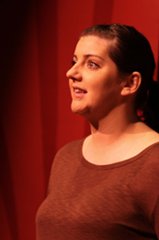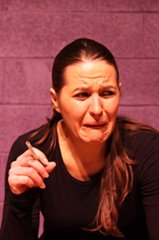.jpg.aspx%3Fwidth=159&height=240) Hostel, written and directed by Fionnuala Kennedy, is a short but vivid performance that explores the plight of young women in a homeless hostel in Belfast. The work was first performed for two nights during the Belfast Fringe Festival before Kabosh decided to take it on tour as part of their social cohesion work. It aims to uncover some of the unexpected realities behind statistics, newspaper headlines and social prejudices about homelessness, and it does so very effectively. It played for women’s groups during the International Women’s Day Celebrations, and Open Door Housing Association hosted a performance to commemorate the 40th anniversary of the Simon Community. The show is touring to both community venues and professional theatre spaces and is an example of a piece that transfers across the community/professional divide. The set design uses only very simple props – three metal stools in a staggered row, water bottles, clipboards and cups – and the space is created and mapped out by the actors’ movements, making this a piece that can play in almost any space.
Hostel, written and directed by Fionnuala Kennedy, is a short but vivid performance that explores the plight of young women in a homeless hostel in Belfast. The work was first performed for two nights during the Belfast Fringe Festival before Kabosh decided to take it on tour as part of their social cohesion work. It aims to uncover some of the unexpected realities behind statistics, newspaper headlines and social prejudices about homelessness, and it does so very effectively. It played for women’s groups during the International Women’s Day Celebrations, and Open Door Housing Association hosted a performance to commemorate the 40th anniversary of the Simon Community. The show is touring to both community venues and professional theatre spaces and is an example of a piece that transfers across the community/professional divide. The set design uses only very simple props – three metal stools in a staggered row, water bottles, clipboards and cups – and the space is created and mapped out by the actors’ movements, making this a piece that can play in almost any space.
 The central character is Maria, a young woman from working class West Belfast who is a single parent with a small daughter, Chloë. Maria was planning to go to university before she became pregnant, and is struggling to establish a secure home and a better future for herself and her child. When she separates from her child’s father, however, she must find somewhere to live. Her mother is reluctant to take them in and she ends up staying with friends; but she feels that her “screaming toddler” is too much for them. The play opens with Maria’s arrival at the hostel, and then uses storytelling techniques to bring the audience back in time through her argument with her mother and encounters with the Housing Association, up to the point of her arrival in the hostel. The story of her life there, meeting other mothers, finding out their stories and waiting for a Housing Executive offer is given a funny, lively treatment with Louise Matthews and Caroline Curran playing multiple male and female roles while Julie Maxwell is always Maria, introducing the scenes, commenting wryly on the action, and guiding the audience through the play.
The central character is Maria, a young woman from working class West Belfast who is a single parent with a small daughter, Chloë. Maria was planning to go to university before she became pregnant, and is struggling to establish a secure home and a better future for herself and her child. When she separates from her child’s father, however, she must find somewhere to live. Her mother is reluctant to take them in and she ends up staying with friends; but she feels that her “screaming toddler” is too much for them. The play opens with Maria’s arrival at the hostel, and then uses storytelling techniques to bring the audience back in time through her argument with her mother and encounters with the Housing Association, up to the point of her arrival in the hostel. The story of her life there, meeting other mothers, finding out their stories and waiting for a Housing Executive offer is given a funny, lively treatment with Louise Matthews and Caroline Curran playing multiple male and female roles while Julie Maxwell is always Maria, introducing the scenes, commenting wryly on the action, and guiding the audience through the play.
 The pace and the use of humour are the strengths of the piece. Despite the grim setting and circumstances of the action, the characters are deftly sketched by the script and the performers. Maxwell gives Maria a wide-eyed naïveté and undercuts it by playing to some of the lines to the audience, relying on their knowledge for comic effect. Thus, she goes to the Housing Executive to explain that she is homeless and will need a new house: this elicits a knowing laugh from the audience. Initially naïve, her interactions with the people she meets are generous and largely optimistic. The other characters are delivered with a mixture of comedy and pathos as they cover their vulnerabilities with a swaggering aggression or cynical humour, or occasionally reveal their despair. This is Fionnuala Kennedy’s first play; it will be interesting to see what she does in the future.
The pace and the use of humour are the strengths of the piece. Despite the grim setting and circumstances of the action, the characters are deftly sketched by the script and the performers. Maxwell gives Maria a wide-eyed naïveté and undercuts it by playing to some of the lines to the audience, relying on their knowledge for comic effect. Thus, she goes to the Housing Executive to explain that she is homeless and will need a new house: this elicits a knowing laugh from the audience. Initially naïve, her interactions with the people she meets are generous and largely optimistic. The other characters are delivered with a mixture of comedy and pathos as they cover their vulnerabilities with a swaggering aggression or cynical humour, or occasionally reveal their despair. This is Fionnuala Kennedy’s first play; it will be interesting to see what she does in the future.
Lisa Fitzpatrick lectures in drama at the University of Ulster.